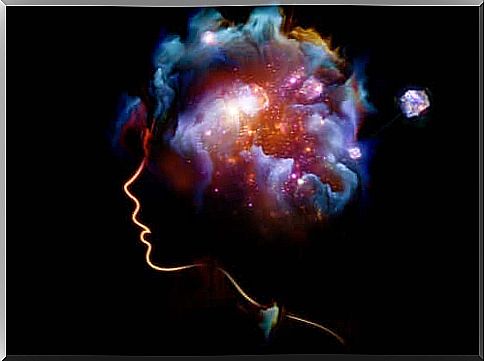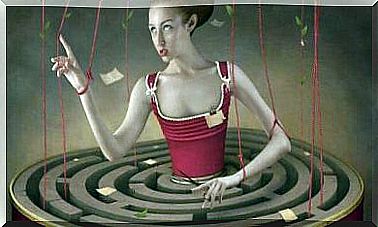Common Anxiety-creating Cognitive Distortions

Anxiety-inducing cognitive distortions have a very clear purpose: to amplify our suffering. The mind gets stuck in rigid and negative thought patterns. The result is that there is no logic or inner balance, only anxiety. The world is becoming threatening and no problems, no matter how small, can be solved.
This type of psychological dynamic is characteristic of conditions such as anxiety and depression. However, we should note that we all use cognitive distortions. For example, everyone has had thoughts like: “I feel really clumsy right now. I must be completely incompetent ”.
Basically, our mind tends to process certain situations in a wrong and harmful way. But most of the time we always try to stay in control. When we then analyze reality in a calmer way, we can choose to use a more realistic and friendly attitude.
However, problems arise when it is simply not possible to be analytical and rational. In such situations, everything becomes extremely complicated and we lose the ability to control the thoughts that go around in our heads. In other words, we have minimal psychological resources and it is then that we begin to nurture these corrosive negative distortions.
In light of this, it is important not to let cognitive distortions take over. The wisest thing to do is to pay attention to and recognize them, learn how they work and neutralize them.
Our most common anxiety-creating cognitive distortions
“I can’t stand it anymore, it’s unbearable. I think I’m going crazy “,” I’m useless “,” I’m sure everything will only get worse in the future “. This type of reasoning creates a kind of mental fog, which leaves no room for anything other than anxiety. If you constantly reinforce these kinds of thoughts, it will make you completely exhausted.
Cognitive distortions are a flurry of thoughts, which causes people to systematically misinterpret information about the environment, what is happening around them and what they perceive. It is not easy for a person to know why she is using this kind of mechanism. Sometimes it is due to a system of feedback between the emotions and the thoughts themselves.
On second thought, it’s like a cycle. You do not feel well and therefore you start to have negative thoughts. As a result, you feel even worse. Other times, the cognitive distortions follow different schedules that a person regularly uses throughout his life without even being aware of it. An awkward upbringing or loveless parents can cause a person to misinterpret things. It is also easier to fall into these mental traps if you have low self-esteem.

Here are some common anxiety-causing cognitive distortions:
Disaster thinking
To always start from the worst in order to be prepared for whatever may come. People often imagine that this is a good strategy, but in reality it only leads to significantly higher anxiety levels.
Here are two common examples of this cognitive distortion: “If I do not pass the test, I will never get a good job” and “I know that we will all soon be fired and that everything will go downhill”.
Dichotomous thinking
When we talk about dichotomous thinking, we mean reasoning that begins with the words “always”, “never”, “everything” or “nothing”. In principle, it is a way of processing reality that presupposes that everything is either black or white. You are either for or against me. Either I’m very good or I’m bad.
This way of attributing extreme values to phenomena without acknowledging any intermediate positions gives rise to great suffering.
Selective abstraction
Have you noticed how your attention sometimes has a strange tendency to just focus on the negative sides of life? Selective abstraction is one of our most common anxiety-creating cognitive distortions. It arises when you focus only on the darkest side of your reality. By doing so, you interpret situations in the way that is most unfavorable to yourself.
An example of this kind of thinking is: “I invited everyone in the office to my birthday party, but Claudia has not come. I’m convinced she hates me and the others are probably only here because they feel compelled ”.
Personalization – another of our most common anxiety-creating cognitive distortions
“My boss is arguing with someone in the office. It’s probably because I did something wrong. ” “The cashier was rude to me. It was probably because people simply did not like me. ” “It went badly for my friend on the test. It’s my fault; I could have helped her more. I’m a terrible friend. ”
This kind of thinking is the result of the negative inner dialogue that people bring with them and that causes them to personalize all the facts and act as if all the responsibility fell on them.

Arbitrary inference
Anxiety often leads people to believe that they are the oracle in Delphi. If you suffer from anxiety, you know that it is easy to take on the role of fortune teller in many different situations. The most common are the following:
- You think you are one hundred percent sure of what others think of you. You are so convinced that your mind is constantly tormenting you with thoughts such as: “He thinks I’m a zero” or “She’s just friends with me because she feels sorry for me.”
- It also often happens that you fall into the trap of “looking to the future”. You tell yourself that you will not do anything right, that everything will go to the forest, and so on.
In short, learning more about our most anxious cognitive distortions gives us two powerful tools. First, we have the opportunity to discover the thought patterns that give us these unpleasant feelings. Second, we can learn to understand how the human mind works and how it can become our worst enemy if we do not set boundaries.
Learn to take care of your mind. Because in the end, this is where thoughts, understanding, emotions and even chaos arise.









